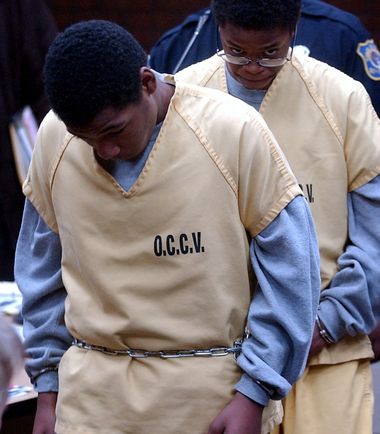US SUPREME COURT TO LOOK AT LIFE IN PRISON FOR JUVENILES
WASHINGTON November 7, 2011 (AP)
The Supreme Court on Monday agreed to decide whether juveniles convicted of killing someone may be locked up for life with no chance of parole, a follow-up to last year’s ruling barring such sentences for teenagers whose crimes do not include killing.
The justices will examine a pair of cases from the South involving young killers who are serving life sentences for crimes they committed when they were 14.
Both cases were brought by the Equal Justice Initiative in Montgomery, Ala. The institute said that life without parole for children so young “is cruel and unusual” and violates the Constitution.
The group says roughly six dozen people in 18 states are under life sentences and ineligible for parole for crimes they committed at 13 or 14.
Kuntrell Jackson was sentenced to life in prison in Arkansas after the shooting death of a store clerk during an attempted robbery in 1999. Another boy shot the clerk, but because Jackson was present he was convicted of capital murder and aggravated robbery.

Evan Miller, foreground, and Colby Smith, wait for a jailer to take them back to the lockup after the teens pleaded not-guilty to capital murder and robbery charges Thursday. Photo by Clyde Stancil 2/2/06
Evan Miller was convicted of capital murder during the course of arson. A neighbor, while doing drugs and drinking with Miller and a 16-year-old boy, attacked Miller. Intoxicated, Miller and his friend beat the man and set fire to his home, killing the 52-year-old man. Miller’s friend testified against him, and got life in prison with the possibility of parole.
The high court has moved toward judging juveniles less responsible than adults when considering severe sentences.
The high court ruled out the use of the death penalty for people under 18 in 2005. In May 2010, the court said that teenagers may not be locked up for life without a chance of parole if they haven’t killed anyone. Justice Anthony Kennedy wrote the majority opinion in both of those decisions.
“The identical analysis which led to the results in those cases logically compels the conclusion that consigning a 14-year-old to die in prison through a life-without-parole sentence categorically violates the Eighth and Fourteenth Amendments,” Miller’s lawyer Bryan Stevenson said in court papers. The Supreme Court should “make that logical conclusion the law of the land.”
The court will hear arguments next year.
The cases are Miller v. Alabama, 10-9646 and Jackson v. Arkansas, 10-9647.
VOD: click on the following links to read Supreme Court questions and state court of appeals decisions in the cases:
Kuntrell Jackson questions and Kuntrell Jackson v State of Arkansas
Evan Miller questions and http://willamettelawonline.com/2011/11/miller-v-alabama/.
SUPREME COURT DECISION COULD HAVE MAJOR IMPACT IN MICHIGAN
Tuesday, November 08, 2011
By John Barnes MLive.com
The U.S. Supreme Court has decided to hear two cases involving whether life sentences without chance of parole for minors in death cases constitutes cruel and unusual punishment.
With more “juvenile lifers” serving the mandatory sentences in Michigan than almost any other state, 358, the high court’s decision could have a large impact here.
The ruling comes as a similar case makes its way through federal court in Detroit. It was not immediately clear what impact Monday’s decision will have on the progress of the Michigan case.
It also comes as Mlive.com and its affiliated Booth Newspapers are running a series this week on juvenile lifers.
In deciding to hear the two new cases, the Supreme Court is potentially extending the reach of two recent decisions involving how juveniles are treated in adult court.
In 2005, the court ruled minors 17 and younger could not be given the death penalty.
In 2010, the court extended protections, ruling a minor could not be sentenced to life without parole in non-homicide cases.
In both cases, the majority of justices ruled juveniles’ mental abilities are lesser developed than adults, and sentencing them as such violates the Eighth Amendment protection against cruel and unusual punishment.
The new cases would move the bar even further, banning mandatory life involving juvenile homicides, including when the juvenile was present at a crime, but did not commit the actual killing. About one-third of Michigan juvenile lifers fall in that category.
Both inmates in the cases involve 14-year-olds. But some Supreme Court watchers believe the justices would be unlikely to confine their ruling to that specific age, given their prior rulings using the 18th birthday as the constitutional dividing line.
There are about 70 such prisoners nationwide, according to the Equal Justice Initiative, a nonprofit law firm in Alabama that represents the inmates.
Six juvenile lifers in in Michigan were 14 at the time of their crimes, including Dontez Tillman, the state’s youngest. He was profiled Monday on Mlive.com.






